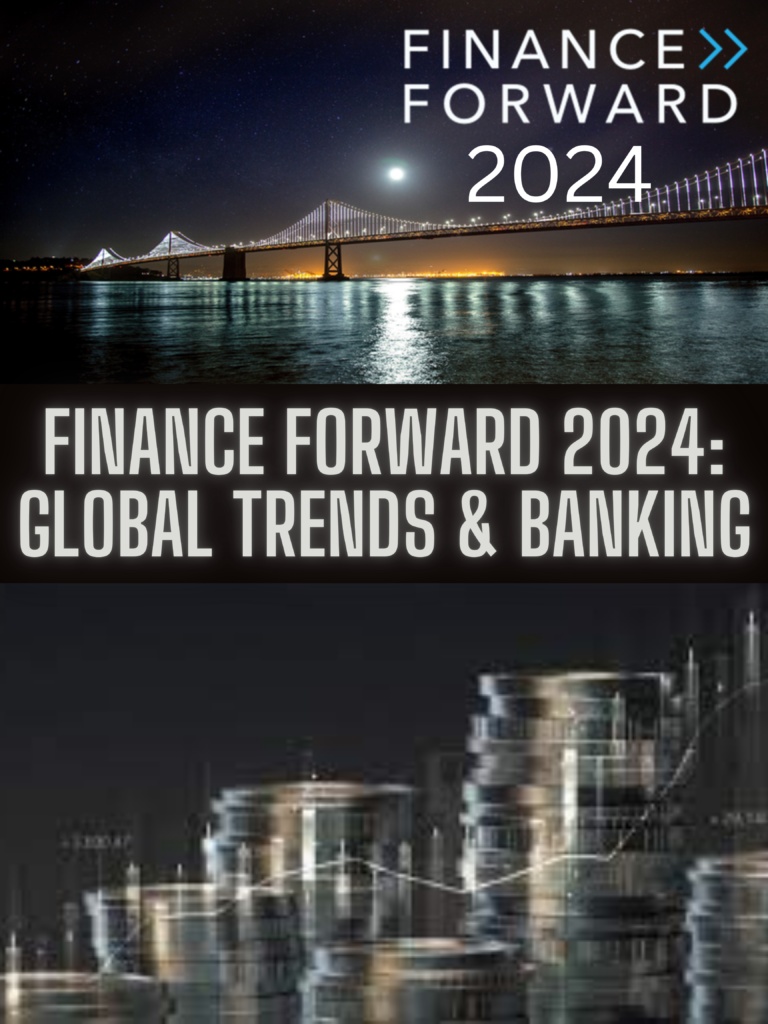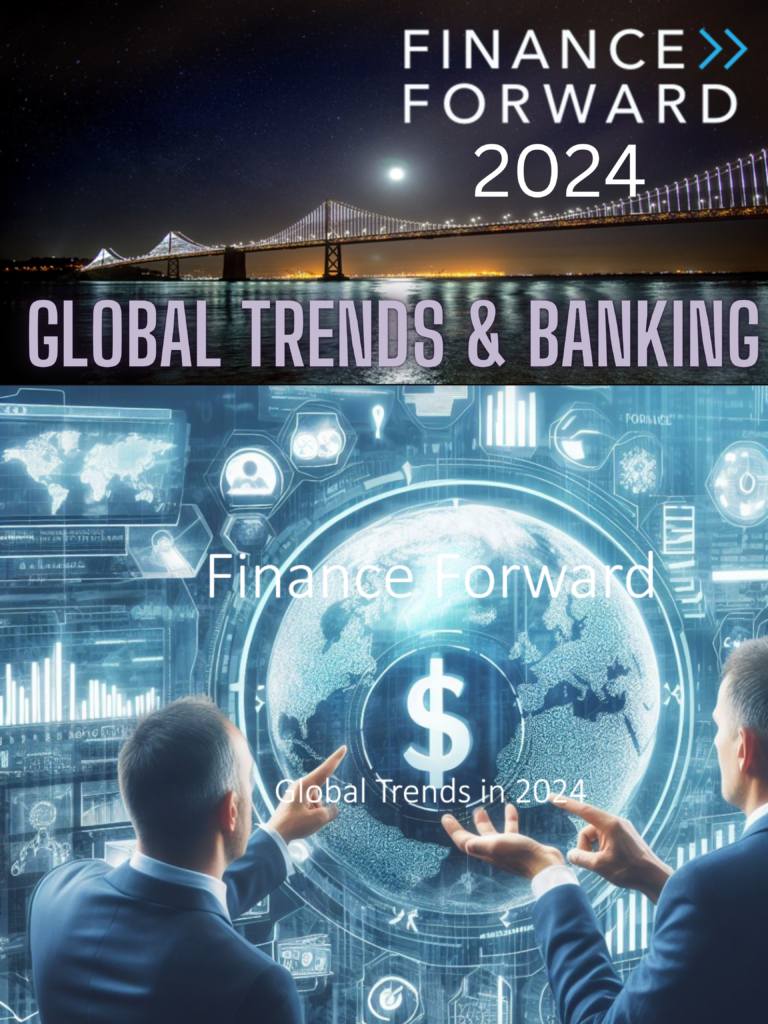Finance Forward 2024: Global Economy, Banking Trends, and the Impact on Developing Countries
Introduction
Finance Forward 2024: Global Economy, Banking Trends, and the Impact on Developing Countries. The global financial landscape is evolving rapidly, with significant implications for both the world economy and the banking sector. In this article, we’ll delve into the key factors shaping the financial world in 2024.
Where is the Global Economy Heading in 2024?
Global Economic Outlook
According to the World Economic Forum’s Chief Economists Outlook, the global economy is expected to weaken in 2024, with 61% of chief economists surveyed predicting a decline in economic growth. The report also suggests that geopolitical tensions and domestic political issues could create economic volatility in the year ahead.

IMF and World Bank Projections-Finance Forward 2024
The International Monetary Fund (IMF) has projected that global economic growth will slow down to 2.9% in 2024, a downgrade of 0.1 percentage point from the group’s last projection in July. The World Bank has also predicted a sharp slowdown in global economic growth, with the global economy projected to grow by 1.7% in 2023 and 2.7% in 2024.
Impact on Developing Countries: Finance Forward 2024
The impact of a global economic slowdown on developing countries can be significant. According to a report by Oxfam International, the global economic crisis of 2008 had a devastating impact on poor people and countries worldwide, with pockets of export-dependent workers and industries in countries like Ghana and Indonesia particularly affected. The report highlights the importance of social protection as a development issue and the need to manage risk and volatility at all levels.

The National Geographic Society suggests that globalization can have both positive and negative effects on developing countries. While globalization has shown to increase the standard of living in developing countries. It can also have a negative effect on local or emerging economies and individual workers.
The United Nations has predicted that developing countries will take a greater long-term hit than wealthier nations due to the COVID-19 pandemic. Africa, Latin America, and the Caribbean are projected to see significantly lower growth compared to pre-pandemic projections, leading to more poverty and less progress on sustainable development and climate action.
Finance Forward 2024: Banking and Capital Markets
Challenges to the Banking Industry
The banking industry faces multiple fundamental challenges to their business models in 2024. Banks’ ability to generate income and manage costs will be tested in new ways. Multiple disruptive forces are reshaping the foundational architecture of the banking and capital markets industry.
Key Drivers of Transformation
Higher interest rates, reduced money supply, more assertive regulations, climate change, and geopolitical tensions are key drivers behind this transformation. The exponential pace of new technologies, and the confluence of multiple trends, are influencing how banks operate and serve customer needs.
Emerging Trends
The impact of generative AI, industry convergence, embedded finance, open data, digitization of money, decarbonization, digital identity, and fraud will grow in 2024.
How Does Digitization of Money Affect the Banking Industry?
Fintech and Digitization
The digitization of finance has spurred by innovations encompassed in the term fintech, including artificial intelligence, big data, biometrics, and distributed ledger technologies like blockchains.
Challenges and Opportunities
Digitization has enabled banks to offer a wide range of financial services to customers through online platforms, mobile apps, and other digital channels. This allows customers to understand the many benefits offered and choose between different plans and packages.
How Does Digitization of Money Affect Customers?
Changing Customer Preferences
According to a survey conducted by Deloitte Insights, the pandemic is continuing to reshape banking preferences and behaviors among US consumers. Digital banking—perhaps for the first time—may be contributing to overall satisfaction with banks, which still remains quite robust overall.
Balancing Digital and Physical Channels
The survey indicates that consumers will continue to use digital channels for simple transactional activities. But many consumers desire high-touch interactions for more complex products and services, such as mortgages and financial advice. Meeting consumers’ latent need for the human touch in digital channels is a real opportunity for banks. Younger consumers surveyed demonstrate a preference for both physical and digital channels. However, they are less satisfied with their primary banks, and they are also at a higher risk of switching. Generally, they are also more open to financial products from digital-only banks and large technology companies.
What Are Some Benefits of Digitization for Customers?
Advantages of Digitization
Digitization has transformed the world in an unimaginable way just a few decades ago. The advantages of digitization are faster access to information. And improved customer experience, increased productivity, lower operational costs, improved decision making, improved information security, higher mobility, automation of business processes, agility, and disaster recovery.
Conclusion
In conclusion, the financial world in 2024 is characterized by global economic challenges. The evolving banking industry, and the impact of digitization on both financial institutions and customers. Developing countries are particularly vulnerable to economic slowdowns, while the banking sector must adapt to a rapidly changing landscape. The benefits of digitization are clear, but they come with their own set of challenges and opportunities.
Finance Forward 2024 Conference
FinanceFWD is hosting a conference in May 2024 to discuss the transformation of the financial world with key players from banks, crypto specialists, and other visionaries.
Disclaimer
This article has been created on the basis of internal data, information available publicly, and other reliable sources to be believed. The article may also include information which are the personal views/opinions of the authors. The information includes in this article is for general, educational, and awareness purposes only and is not a full disclosure of every material fact.
All the information on this website – World Virtual CFO – is published in good faith and for general information purposes only. World Virtual CFO does not make any warranties about the completeness, reliability, and accuracy of this information. These are my views for only information purposes. Any action you take upon the information you find on this website (World Virtual CFO), is strictly at your own risk. World Virtual CFO will not be liable for any losses and/or damages in connection with using our website. For details please refer to our disclaimer page.
Dr. Dinesh Sharma is an award-winning CFO and AI strategist with over two decades of experience in financial leadership, digital transformation, and business optimization. As the founder of multiple niche platforms—including WorldVirtualCFO.com—he empowers professionals and organizations with strategic insights, system structuring, and innovative tools for sustainable growth. His blogs and e-books blend precision with vision, making complex financial and technological concepts accessible and actionable.